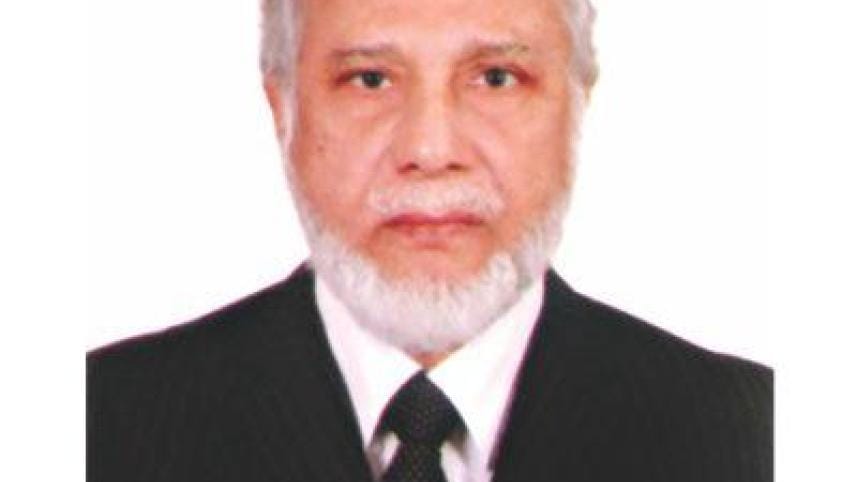Justice Khairul terms verdict immature

Law Commission Chairman ABM Khairul Haque yesterday strongly criticised the Supreme Court verdict in the case over the 16th amendment to the constitution, terming it misconceived, irrelevant and immature.
The SC made its observations overlooking “the main issue of the case”, he told a press conference at his office in the capital.
Some constitutional provisions were misinterpreted in the verdict, noted Khairul, also a former chief justice.
The constitution needs to be amended for restoring the Supreme Judicial Council (SJC), as the provision of the SJC was not there in the constitution, he pointed out.
“Is the chief justice a headmaster and are other judges his students that he [CJ] has to control them,” he asked.
The Law Commission chief said the judges are independent under Article 94(4) of the constitution.
“Article 1 of the constitution talks about a people's republic, but this verdict is taking the country towards a judges' republic.”
Khairul said it was reported in the media that the SC sent a letter to the Anti-Corruption Commission, asking it to stop an enquiry about a retired judge.
“How can we rely on them [SJC members]? We cannot rely on the Supreme Judicial Council. We have confusion as transparency may not be there.
“The Supreme Court will correct the members of parliament if they make mistakes, but where will we go if the Supreme Court judges do any wrong.”
He said the SC judgment undermined the parliament members.
In the SC verdict, the author judge (chief justice) said the current parliament is “immature” and also made derogatory remarks about its members, he added.
“If the chief justice says the current parliament is immature, I have to say the Supreme Court judges are immature as they unnecessarily used derogatory and unparliamentarily language about the parliament members in the verdict.
“Why irrelevant observations should be made in the apex court verdict. We feel that it should not have been done.”
Khairul said it's not right that a constitutional organisation would term another constitutional organisation immature.
The author judge even observed that the parliament members should ponder whether they are qualified enough to be lawmakers, he mentioned.
Khairul, however, said parliament can enact a law but cannot bring any changes to the basic structure of the constitution. “Independence of the judiciary is a basic structure of the constitution, which cannot be curbed.
“We have noted that a few judges made derogatory comments about parliament before delivering the verdict. Therefore, it can be said there was a plan for delivering such a verdict long before the hearing in the case began.”
Khairul said he didn't agree with the opinion that independence of the judiciary would be curbed in the absence of the SJC.
“The original constitution of 1972 empowered parliament to remove [SC] judges. At that time, we knew that the judiciary was independent. But now it is being said that there will be no independence of the judiciary without the Supreme Judicial Council.
“I think the Supreme Judicial Council doesn't have much to do with independence of the judiciary.”
The former chief justice said people are the owners of the republic and parliament represents the sovereign people. “When everyone is accountable to parliament, there is no reason why judges should be an exception to this.”
Khairul said that once the judgment of a court is delivered, people have the right to criticise it.
“Nobody is above criticism. Even the Supreme Court is not above criticism.”
He wondered where people would go if the SC makes mistakes.
Khairul said there is no legal bar to criticising judgments from one's perspective, and that the Law Commission organised the press conference to express its impartial opinion.
He further said he went through the 799-page SC verdict and found it was made lengthy unnecessarily by making illogical and irrelevant comments.
On August 1, the SC released the full verdict in which Chief Justice Surendra Kumar Sinha observed that the amendment giving the president powers to have control over lower courts violates the basic structure of the constitution.
In the verdict, the apex court made observations on different issues including democracy, politics, martial law, the Election Commission, good governance, corruption and independence of the judiciary.
The SJC was restored through the SC verdict, and it held its first meeting on August 6.



 For all latest news, follow The Daily Star's Google News channel.
For all latest news, follow The Daily Star's Google News channel.
Comments